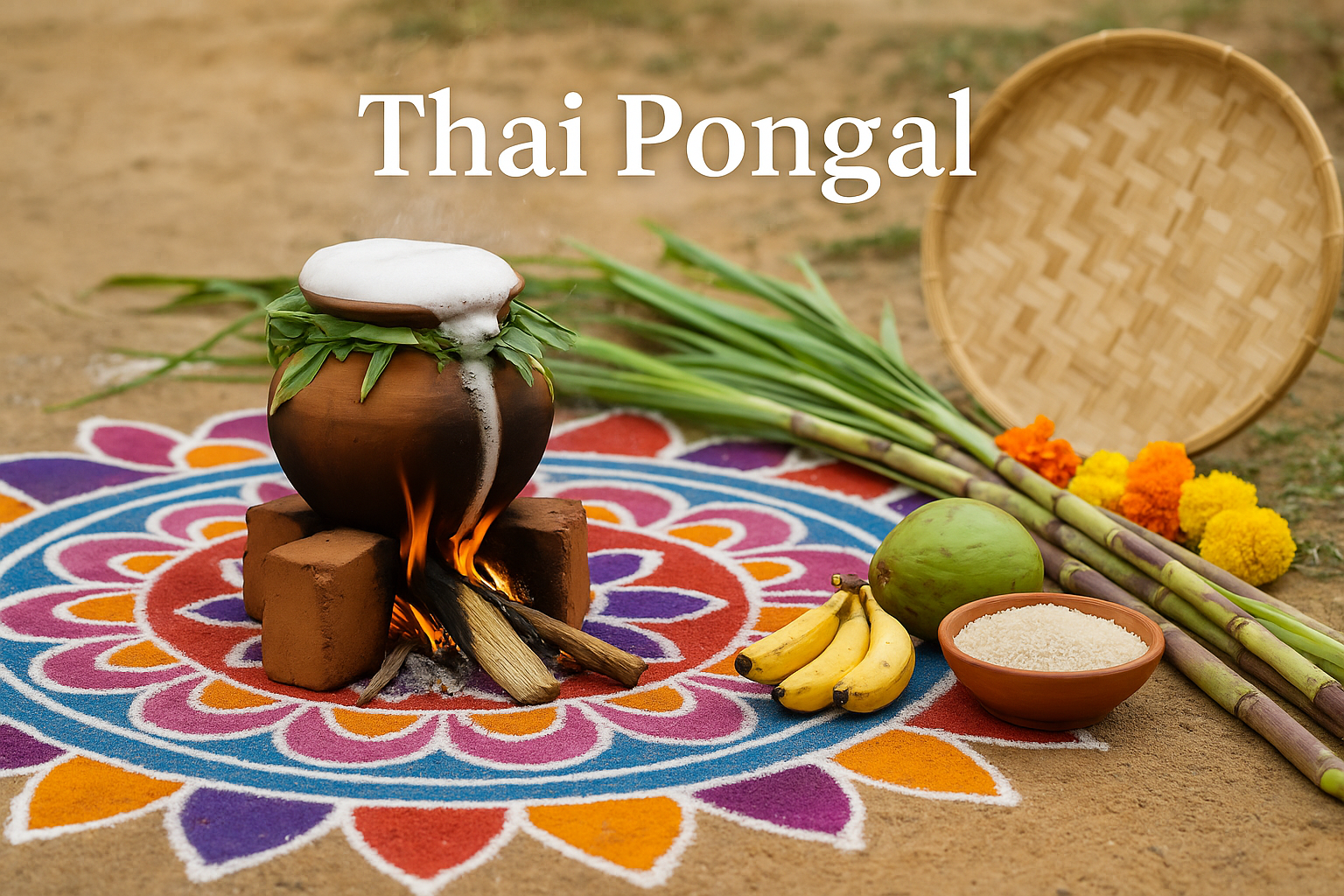🌾 Thai Pongal 2026: A Joyous Harvest Festival of Gratitude and Prosperity 🎉
Thai Pongal is a Tamil harvest festival celebrated with much fervor and joy, marking the beginning of the auspicious month of Thai in the Tamil calendar.
Thai Pongal is a Tamil harvest festival celebrated with much fervor and joy, marking the beginning of the auspicious month of Thai in the Tamil calendar.

Thai Pongal is a vibrant and auspicious harvest festival celebrated predominantly by Tamil communities worldwide. 🌍It marks a time of gratitude towards nature, a celebration of prosperity, and a deep connection with age-old traditions. 🌾✨
Held every year in mid-January, Thai Pongal is not just about boiling rice and milk under the sun; it’s a soulful offering to nature that nourishes humanity. 🌞💛 In this comprehensive guide, we will explore the meaning, history, rituals, celebrations, foods, and modern relevance of Thai Pongal. 🌟
The word "Pongal" in Tamil means "to boil over". 🍚🔥 This signifies abundance and prosperity overflowing in homes and hearts.Historically, Thai Pongal dates back to the Sangam Age (200 BCE – 300 CE) and is closely associated with sun worship and agriculture. 🌻
Farmers offer thanks to Surya (the Sun God) for a bountiful harvest after months of hard labor. 🌞🌾 Thai Pongal also beautifully ties in with other Ancient Festivals of India, reflecting the profound relationship between humans, nature, and divine forces. 🙏✨
Thai Pongal is typically celebrated between January 14 and January 17, coinciding with the winter solstice and the start of the Tamil month of Thai. 🗓️
Bhogi Pongal (First Day): January 14, 2026
Thai Pongal (Main Festival): January 15, 2026
Mattu Pongal (Day for Cattle): January 16, 2026
Kaanum Pongal (Family Day): January 17, 2026
Each day holds special significance and rituals, creating a four-day-long celebration filled with joy and cultural richness. 🌸🎉
Thai Pongal celebrations are deeply ritualistic, joyous, and family-centric. Let's dive into the beauty of each day! 🌟
People discard old belongings 🛏️ and clean their homes 🏠 to welcome prosperity.
Bonfires are lit, symbolizing the destruction of negativity. 🔥
Freshly harvested rice, jaggery, milk, and ghee are boiled together in a clay pot. 🍚
The pot is allowed to overflow as a symbol of abundance.
Families offer the Pongal dish to Surya, thanking him for blessings. 🌾🌟
Cows and bulls are bathed, decorated with bells, paint, and flowers. 🌼
They are fed Pongal dishes and worshipped, acknowledging their role in agriculture. 🙏
Families gather for picnics and outings. 🎉
Elders bless the younger generation.
Sweets and gifts are exchanged, strengthening family bonds. 🎁
Intricate patterns made from rice flour are drawn at entrances.
They are believed to invite prosperity and ward off evil spirits. 🌸
The Pongal dish (sweet or savory) is the heart of the festival.
Ingredients like rice, milk, jaggery, ghee, cashew nuts, and raisins symbolize wealth and wellness. 🍯🌾
Sugarcane stalks, turmeric plants, coconut, bananas, and flowers are offered.
Special prayers and hymns are chanted to honor natural elements and gods. 📿🌼
Despite rapid urbanization, Thai Pongal remains a strong cultural anchor for Tamil people globally. 🌍It instills values of gratitude, community living, respect for nature, and family bonding. 🌳❤️
In today's world, where environmental concerns are growing, festivals like Thai Pongal remind us of the importance of sustainability and natural harmony. 🌎♻️
No festival is complete without delicious feasts! 🍽️ Thai Pongal offers a variety of mouth-watering dishes:
Sakkarai Pongal (Sweet Pongal) 🍚🍯
Ven Pongal (Savory Pongal) 🥣
Medu Vada (Crispy Lentil Donuts) 🍩
Payasam (Rice Kheer) 🍶
Murukku (Crispy Spirals) 🌀
These dishes are not just tasty but also hold symbolic meanings of prosperity, sweetness, and happiness. 🎉
While Thai Pongal is celebrated by Tamilians, similar harvest festivals are celebrated across India:
FestivalRegionKey FeaturesMakar SankrantiNorth IndiaKite flying, sweets made of sesame seedsLohriPunjabBonfires, singing, and dancingBihuAssamFolk dances, feasts, and traditional gamesPongalTamil NaduCooking Pongal, cattle worship, family gatherings
Just like Raksha Bandhan strengthens the sibling bond across India, Thai Pongal strengthens the bond with nature and community. 🌸👨👩👧👦
Today, Thai Pongal is celebrated with great enthusiasm among Tamil communities in:
Sri Lanka 🇱🇰
Malaysia 🇲🇾
Singapore 🇸🇬
South Africa 🇿🇦
United Kingdom 🇬🇧
United States 🇺🇸
Canada 🇨🇦
Australia 🇦🇺
In many places, public Pongal cooking events, cultural programs, and temple festivals are organized, preserving and promoting Tamil culture worldwide. 🌎🎉
In recent years, eco-conscious Pongal celebrations have gained popularity:
Using biodegradable clay pots 🍯
Creating natural kolams with organic colors 🌸
Avoiding plastic decorations 🚫
Distributing plant saplings as gifts 🌱
Celebrating Pongal in an eco-friendly manner ensures that future generations inherit a greener planet. 🌍💚
Many schools and universities organize Thai Pongal competitions, encouraging students to:
Create beautiful kolam designs 🌀
Cook Pongal dishes 🍛
Write essays and poems about the importance of gratitude ✍️
This fosters cultural pride and a sense of responsibility among the youth. 🧑🎓🌟
Thankfulness towards nature 🌞🌾
Celebration of prosperity and new beginnings 🌼
Strengthening family and community bonds 👨👩👧👦
Preserving ancient traditions in the modern world 🏛️
Thai Pongal beautifully connects the past, present, and future, making it a timeless celebration of life. 🌟🎉
As the aroma of freshly cooked Pongal fills the air and vibrant kolams decorate every doorstep, Thai Pongal 2026 promises to be a festival of positivity, love, and gratitude. 🍚🌞
Let's embrace this festival not just as a tradition, but as a lifestyle of grateful living and harmony with nature. 🌍💚
Wishing you and your family a Happy Thai Pongal 2026! 🎉🌾 May your lives overflow with health, wealth, and happiness!
Writer and content creator
Log in to share your thoughts and engage with other readers.